No Country for Rural Lawyers: Small-town attorneys still find it hard to thrive
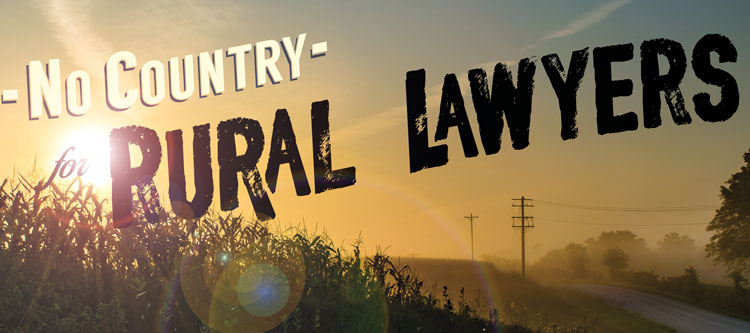
Photo illustration by Brenan Sharp/Shutterstock
When Brian Lohse graduated from Drake University Law School in 1995, he went to work at a small practice in Lee County, a rural area of Illinois.
As a general practitioner, Lohse says he handled “everything under the sun,” ranging from traffic tickets to real estate, from divorces to assisting with a murder trial.
He says he liked the work, but between student loans and household expenses, he couldn’t make ends meet on his small-town salary. At three years out of law school, Lohse was only making $27,000 a year.
“It just became economically unfeasible for us to continue,” he says. “I would have liked to have stayed there. If the finances had been there, we probably would have.”
Instead, he moved to Iowa and took a job with an insurance company in Des Moines, working in the claims department. Within three months, his salary had jumped to $33,000.
Fast forward to September of 2012, when Lohse’s fortunes took a turn no one could have anticipated: He and his wife won a $202.1 million Powerball jackpot, totaling about $91 million after taxes.
Lohse and his wife used some of the proceeds to create the Lohse Family Foundation, which donates to a slew of causes. Among other recipients was his alma mater, Drake University Law School, which recently created the Rural Access to Justice Initiative aimed at addressing the well-documented shortage of rural attorneys.
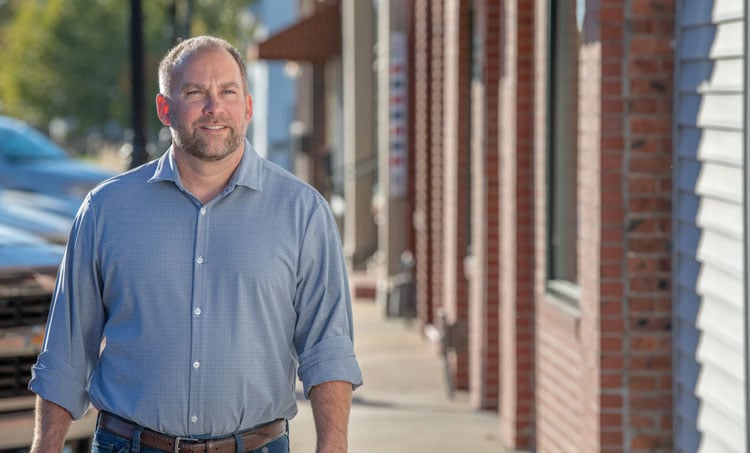
Photo courtesy of Brian Lohse
Lohse pledged to donate $75,000 a year for at least five years to the program.
“Drake Law School let us know about the Rural Access to Justice Initiative that they had created,” says Lohse, who was elected in 2018 to the Iowa House of Representatives. “We knew we wanted to be a part of it.”
The program, which launched in 2018, is one of many efforts underway throughout the country aimed at addressing an attorney shortfall in rural America. Nearly 20% of the country’s residents live in rural areas, but only 2% of attorneys nationwide practice in rural areas or small towns, according to a 2014 study published in the South Dakota Law Review. Some rural counties have no lawyers at all. In Nebraska, for example, 11 of the state’s 93 counties lack any attorneys, according to the Nebraska State Bar Association.
The situation is only expected to worsen in the near future, given that many lawyers in less-populated counties are approaching retirement age and no younger attorneys have moved in to replace them.
In New York state, for instance, a survey of 900 rural lawyers found that 74.3% were 45 or older, and more than 46% said they planned to retire within 10 years, according to an April 2019 report by the Government Law Center at Albany Law School.
Many lawyers avoid small towns for reasons ranging from cultural preferences to social life to the economic reality that salaries tend to be higher in metropolitan areas. For example, the mean salary for lawyers in the metropolitan area of Boston and Cambridge, Massachusetts, and Nashua, New Hampshire, was $170,720 in 2018. But the mean salary for lawyers in nearby southwest Maine, a nonmetropolitan area, was just $87,240, according to the Bureau of Labor Statistics.

Photo from Shutterstock
Solving the rural attorney shortage won’t be easy, given that few law graduates appear willing to set up shop in rural America.
Theodore Howard, chair of the ABA’s Standing Committee on Legal Aid and Indigent Defendants, believes the relatively low salaries—compared to large urban areas—combined with living in a remote area make rural practice a hard sell for young lawyers.
“Increasingly, it seems as though folks graduating from law school are reluctant to go to areas that are geographically remote,” he says.
The upshot is that many people in rural parts of the country are unable to obtain help with legal issues that run the gamut from housing problems to drafting a will to family matters.
“We see folks that just get caught in these legal quagmires that they aren’t able to address, and it just escalates,” says Nikole Nelson, executive director of Alaska Legal Services Corp. and special advisor to the ABA’s Standing Committee on Legal Aid and Indigent Defendants.
Stretched thin
Vast swaths of Alaska are so remote they are only accessible by plane or boat. Often those areas lack any private attorneys or police officers and jails—a situation prompting Attorney General William Barr to declare a public safety emergency for rural Alaska in January 2019.
Nelson estimates that the Alaska Legal Services Corp., which represents low-income individuals, turns away one potential client for each one that’s accepted.
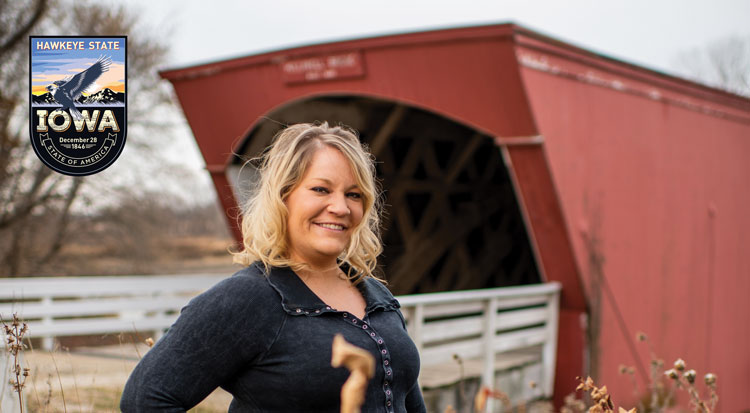
Photo of Maddy Warder by Greg Latza/ABA Journal; Shutterstock
The result is that rural residents of the state who can’t afford to hire private attorneys often are unable to get divorced or obtain custody of children or child support orders. Senior citizens don’t have counsel who can help them with advance directives or powers of attorney, Nelson adds.
Additionally, parts of the state, including Utqiagvik, north of the Arctic Circle, have a well-documented housing shortage exacerbated by problems caused by a lack of good title. Those title problems are sometimes the direct result of a lack of attorneys to draft wills, Nelson says.
When a person dies without a will, property is distributed among heirs; if one or more of the heirs also dies without having made a will, the property is again distributed. The property then becomes fractionalized, with dozens of family members potentially owning a piece of a home, while none hold clear title. But without clear title, it’s virtually impossible to sell the home, and no one has an incentive to make needed repairs.
One new Alaska program that could improve the situation is a medical-legal partnership. That initiative, which got off the ground in 2017, involves embedding legal services attorneys in six hospitals. The attorneys, who have offices in health care settings, represent clients who have been referred by health care professionals for help with housing issues or other legal matters. (For more about medical-legal partnerships, see “A Model Approach.”)
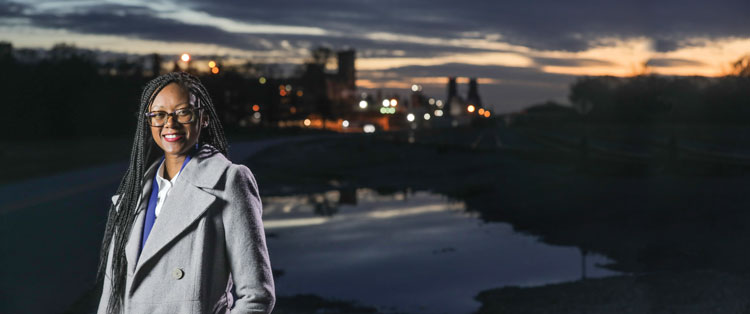
Photo of Furonda Brasfield by Stephen Thornton/ABA Journal
“There are some economies of scale that come through working with other professionals who are screening for legal needs,” Nelson says.
Alaska doesn’t have a law school, and many of the attorneys who work for the state’s legal services corporation take the job with the understanding they’ll leave after a short time. Other states are hoping to recruit attorneys to rural parts of the country on a more long-term basis. While it’s too early to know whether those programs will be successful, some have hit roadblocks.
The Drake University Law School program funded by Lohse launched in the fall of 2018 with two recent graduates. The lawyers worked in Oskaloosa, Iowa, a city of roughly 11,500 people, in space donated by Musco Lighting, and they received mentoring by a retired judge. The duo also received stipends of $2,000 a month for the first five months. The plan was for the pair to spend two years in the program, during which time they would build independent practices in Oskaloosa.
But things didn’t go as expected. Both of the lawyers pulled out of the program after about a year. Madison “Maddy” Warder, one of the two participants, says she left after about nine months. “It became financially unfeasible for me to stay,” she says.
Warder says she entered the program with the plan of settling down in Oskaloosa, where her parents had grown up. She even purchased a nearby home, which she now rents out.
But after she opened a practice with her law partner—the other participant in Drake’s program—she found it impossible to draw enough paying clients to sustain the business.
Warder says the town had around 10 practicing attorneys who had been there for decades and “had built up a fairly significant clientele.”
She and her partner decided to target less affluent people. The pair instituted a sliding scale that generally ranged from $50 an hour to $150 an hour, based on factors including clients’ income, number of dependents and fixed monthly expenses.
Warder says that rate was “well below” what some established attorneys in town charged. But even with the discounts, only a few clients materialized.
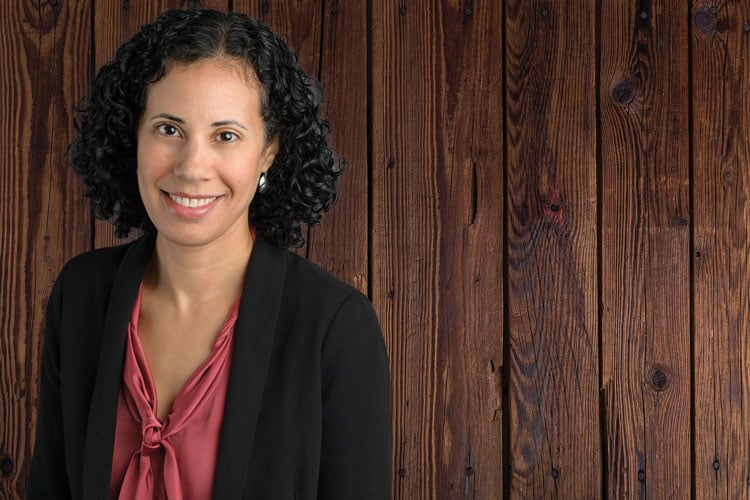
Photo of Lauren Dara Sudeall courtesy of Center for Access to Justice/Georgia State University College of Law; Shutterstock
“I could probably count the number of private pay clients I had on two hands,” she says. Most were either criminal defendants or people who needed assistance with family law issues like divorces and child custody.
Warder says she and her partner certainly attempted to integrate into the legal scene. She says they had lunch every Thursday at Tasos’ Steak House, where the local bar association—along with the occasional judge—dined in the back room. Her partner belonged to a small business club that met once a week in the morning at a coffeeshop.
Still, after the $2,000 a month subsidy ended, they didn’t have enough business to make ends meet.
“The hard part for us was that we had no idea what our paycheck was going to look like at the end of the month—or if we were even going to have one—after that subsidy stopped,” she says.
She started teaching business law for three hours a week at William Penn University. She also began accepting court appointments to represent criminal defendants in Mahaska County, where Oskaloosa is located, and other nearby counties, at rates ranging from $60 to $65 an hour.
These court assignments required her to spend hours simply driving between counties.
She used that time to listen to voice recordings handed over in discovery and talk on the phone for work.
Even with the teaching gig and court appointments, Warder struggled to pay her mortgage and repay her law school loans.
In May of 2019, she accepted a full-time job with the Woodbury County prosecutor’s office in Sioux City—a move that doubled her salary.
“My work-life balance has been able to stabilize quite a bit,” she says, adding that she now has the time for activities outside of work—even just taking her goldendoodle to the dog park.
Several months after Warder left Oskaloosa, her law partner also departed from the program and took a job with a private firm, according to program director Patricia Houlihan.
Their experience suggests that even when lawyers want to practice in small towns, they may underestimate the hurdles they’ll face.
“The idea was, let’s give these attorneys an office, office equipment, support, place them in this community and launch them,” Houlihan says. “That’s easier said than done.”
‘Legal deserts’
For one thing, getting a law practice off the ground is notoriously hard, even for experienced attorneys.
For new attorneys, the challenges are even greater.
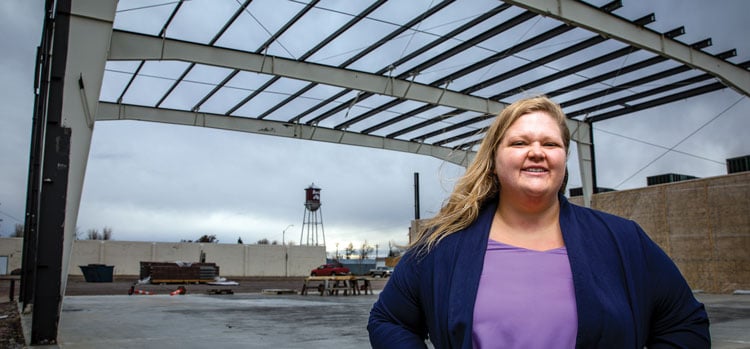
Photo of Rachelle Norberg by Adam Fondren/ABA Journal
“Actually running a law office on your own, while building your business and learning the practice of law—it’s very, very stressful and difficult,” Houlihan says.
On top of that, living in a small town can present its own stresses.
“It can be lonely,” she says, adding: “If you’re going to a small community that you weren’t a part of before, you have to integrate yourself in that community.”
Houlihan says the school is overhauling its approach with an eye toward identifying potential candidates for the program during their first year.
She adds the school is hoping to create internships in rural areas for students between their first and second years.
But she acknowledges the effort to attract many law students to small towns is daunting. “There really isn’t a large pool of new attorneys saying to themselves, ‘I want to work at a small firm in Iowa.’”
Lauren Dara Sudeall, co-author of the 2018 paper “Legal Deserts: A Multi-State Perspective on Rural Access to Justice,” has seen firsthand a lack of enthusiasm among law students for rural practice.
“When I talk to students from rural areas, many have no desire to go back,” says Sudeall, an associate professor and founding director of the Center for Access to Justice at Georgia State University College of Law.
She says many students tend to worry about whether they would have other lawyers to learn from in small towns, as well as about whether they would feel isolated.
Many also have practical concerns about whether they can make a living in rural areas, and whether they can attract clients as sole practitioners.
Against the grain
Bucking the broader trend, some law students and new attorneys say they very much want to practice in remote parts of the country—provided they can sustain a law practice.
In April of 2018, the University of Arkansas at Little Rock William H. Bowen School of Law launched its Rural Practice Incubator program for just those lawyers.
Amy Pritchard, the professor who directs the program, says Bowen often attracts students who are the first in their families to graduate college and want to return to their home communities.
But, she says, “going back and starting a business is just daunting.”
The Bowen program helps make the prospect less daunting by connecting new attorneys with legal mentors, while also giving new lawyers the practical support they need to grow a business.
In its first year, five people participated in the program.
In addition to receiving mentoring, they attended a three-day “boot camp,” where they were taught basic practice skills, business planning strategies and best practices regarding technology.
The program also reimburses participants for $3,000 in business expenses, and offers free legal research software, bar memberships and continuing legal education credits.
The hope is that the program will help new attorneys accept rural clients in the low-to-moderate income range. The state’s 25 most rural counties have just 0.64 attorneys per 1,000 rural residents—well below the state average of 2.04 attorneys per 1,000 residents.
Arkansas also recently made a separate move that could improve many rural residents’ ability to hire lawyers: The state changed its professional conduct rules to allow “unbundling,” meaning that clients can hire lawyers for a limited scope—such as for reviewing a document or appearing for a single hearing.
That way, a client who may not have enough money to pay an attorney a retainer to handle an entire matter can instead pay for more limited representation.
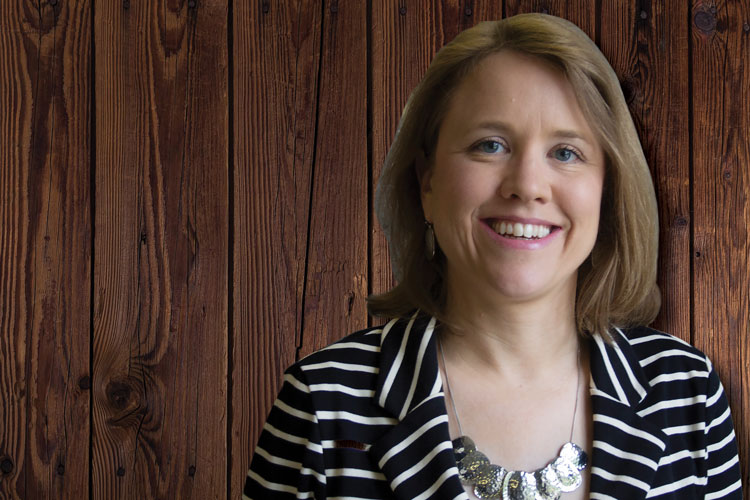
Photo of Amy Pritchard by Megan Douglas/University of Arkansas at Little Rock William H. Bowen School of Law
California and Colorado have passed similar rules.
In the past, an attorney who entered an appearance for a client at a hearing could only withdraw with the court’s permission, Pritchard says.
One lawyer to participate in Bowen’s incubator program, Furonda Brasfield, a native of Stuttgart, Arkansas, says she knew back in law school that she wanted to practice in a rural area, where attorneys were desperately needed.
“There has been a shortage of advocates my whole life,” Brasfield says, referring to the area where she grew up.
Brasfield, a 2015 graduate of the Bowen School of Law, says she was able to get her own firm off the ground with assistance from the rural incubator initiative.
She says the stipend and access to legal research databases were particularly helpful.
Her practice includes family law, auto accidents, workers’ compensation and civil litigation, as well as other areas.
“I’m getting everything from guardianships and probate issues to ‘this guy didn’t come back and finish my roof,’” she says.
Brasfield, who was once a contestant on America’s Next Top Model, has lived in New York City and Los Angeles, but she says she prefers the quality of life in rural Arkansas.
“We have trees, we have grass, people have yards,” she says, adding that the amount she currently pays for a four-bedroom house wouldn’t be enough for a studio apartment in New York City.
Support and stipends
In 2014, South Dakota rolled out a richly funded rural initiative. That program offers stipends of around $13,288 a year for five years, for a total of $66,440, to attorneys who commit to spend five years practicing in a rural county.
Half of the funding comes from the state, 15% from the state bar, and 35% from the county where the attorney works.
“We were seeing legal issues just compound,” says Pat Goetzinger, past president of the State Bar of South Dakota. “Like a health issue, if you let it go, it just gets worse.”
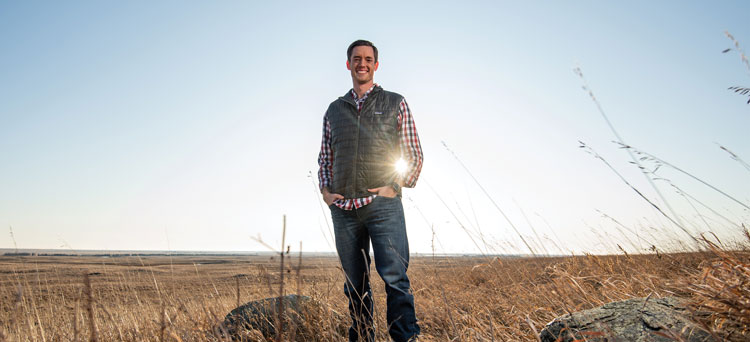
Photo of Austin Hoffman by Greg Latza/ABA Journal; Shutterstock
Goetzinger says that around half of the 22 participants who have so far successfully participated in the program are affiliated with law firms or lawyers who aim to retire soon, while the other half started their own practices. So far, two attorneys have dropped out of the program and repaid the stipends, Goetzinger says.
The first law school graduate to join the program recently completed his five-year stint. He is now working in Minneapolis-St. Paul, according to Goetzinger.
A current participant, Rachelle Norberg, graduated from the University of South Dakota in 2018 and immediately accepted a job at what was then known as the Gunvordahl Law Office, in the same county where she grew up.
She is in the process of purchasing the practice, which has already been renamed Gunvordahl Gunvordahl & Norberg.
Norberg, who also is a real estate broker, says she had always planned to return to her Gregory County hometown after graduating.
But, like some other participants in South Dakota’s rural initiative, she wonders whether she could have managed to get by without the stipend—which she currently is spending on housing and repaying her student loans.
“I always knew I wanted to end up back here,” she says. “I just didn’t think it was going to be possible to come here right out of school.”
Thirty-four-year-old Austin Hoffman is another participant who hung up his own shingle.
After graduating from the University of South Dakota School of Law in 2016 and passing the bar exam later that year, Hoffman moved to Eureka, population around 800, and opened an office.
Hoffman says his home is so remote that it takes him more than an hour to reach the nearest movie theater.
At the time, he had two small children and wanted to be closer to his family.
But Hoffman, who grew up on a nearby farm, says he doesn’t know whether he could have swung a move to Eureka without the stipend.
“If it wouldn’t have been for that program, I don’t know if we would have decided to move back,” he says.
Currently, he works part-time as deputy state’s attorney in McPherson County, where he prosecutes criminal cases.
He also has a private practice representing criminal defendants (in counties other than McPherson), and representing people in civil matters—mainly involving real estate issues, probate and estate planning.
Hoffman partially attributes his ability to get a practice off the ground to a childhood spent in the country.
“If you don’t know anything about agriculture, land, real estate, small-town culture, you’re going to have a hard time making it work,” he says. “Honestly, I think you need to grow up in a rural area to be successful in a rural area.”
This article ran in the February-March 2020 issue of the ABA Journal under the headline:“No Country for Rural Lawyers: Despite incentives, small-town attorneys still find it hard to thrive”



